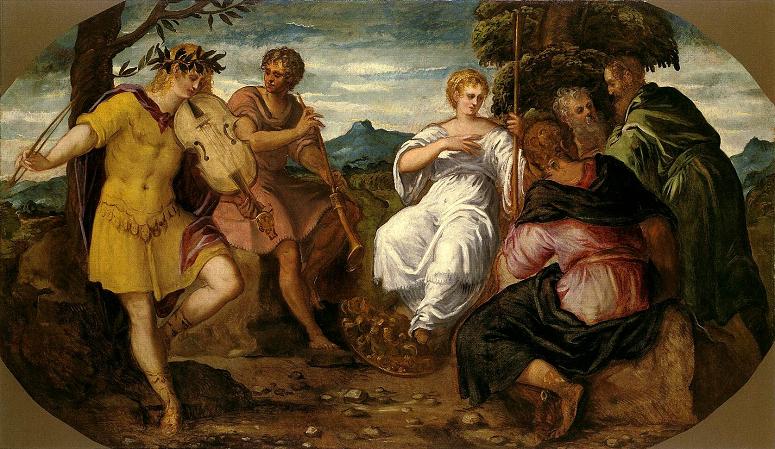
Marsyas. In Greek mythology, the satyr Marsyas is a central figure in two stories involving music: in one, he picked up the double oboe that had been abandoned by Athena and played it; in the other, he challenged Apollo to a contest of music and lost his hide and life.
In antiquity, literary sources often emphasise the hubris of Marsyas and the justice of his punishment. In one strand of modern comparative mythography, the domination of Marsyas by Apollo is regarded as an example of myth that recapitulates a supposed supplanting by the Olympian pantheon of an earlier Pelasgian religion of chthonic heroic ancestors and nature spirits.
Marsyas was a devoté of the ancient Mother Goddess Rhea / Cybele, and his episodes are situated by the mythographers in Celaenae, in Phrygia, at the main source of the Meander. When a genealogy was applied to him, Marsyas was the son of Olympus, or of Oeagrus, or of Hyagnis.
Olympus was, alternatively, said to be Marsyas' son or pupil. Marsyas was an expert player on the double-piped double reed instrument known as the aulos.
The dithyrambic poet Melanippides of Melos embellished the story in his dithyramb Marsyas, claiming that the goddess Athena, who was already said to have invented the aulos, once looked in the mirror while she was playing it and saw how blowing into it puffed up her cheeks and made her look silly, so she threw the aulos away and cursed
In antiquity, literary sources often emphasise the hubris of Marsyas and the justice of his punishment. In one strand of modern comparative mythography, the domination of Marsyas by Apollo is regarded as an example of myth that recapitulates a supposed supplanting by the Olympian pantheon of an earlier Pelasgian religion of chthonic heroic ancestors and nature spirits.
Marsyas was a devoté of the ancient Mother Goddess Rhea / Cybele, and his episodes are situated by the mythographers in Celaenae, in Phrygia, at the main source of the Meander. When a genealogy was applied to him, Marsyas was the son of Olympus, or of Oeagrus, or of Hyagnis.
Olympus was, alternatively, said to be Marsyas' son or pupil. Marsyas was an expert player on the double-piped double reed instrument known as the aulos.
The dithyrambic poet Melanippides of Melos embellished the story in his dithyramb Marsyas, claiming that the goddess Athena, who was already said to have invented the aulos, once looked in the mirror while she was playing it and saw how blowing into it puffed up her cheeks and made her look silly, so she threw the aulos away and cursed
Wikipedia ...